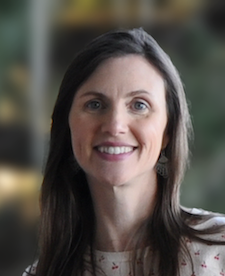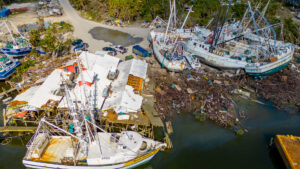By Analeah Karmally, FAU School of Communication and Multimedia Studies
The following is a Q&A conducted with Emily Powell, assistant state climatologist at the Florida Climate Center. Powell’s mission is providing climate services and research that serves people all over the state, such as information on the historical and current weather and climate of Florida.
How do you feel about climate change right now?

I think overall we’re not doing enough to address the challenges that climate change poses to our communities, economies and environment. We’re not doing enough to reduce and reverse greenhouse gas emissions and transition off fossil fuels to address the negative impacts of climate change, which is already having an impact on our communities and our natural environments, particularly vulnerable populations as well as sensitive and degraded natural ecosystems and wildlife. Many people may not understand that climate change affects all aspects of our lives. It’s known as a threat multiplier. This means that it doesn’t necessarily introduce new threats – we’ve always had flooding, hurricanes and drought here in Florida – but it exacerbates these existing threats and other environmental stressors. So the changes that we need are not happening fast enough.
How do you think climate change will affect Floridians in a couple of years?
We have the greatest confidence in projected changes in temperatures and sea level rise. Florida has been warming, especially over the past few decades. Eight of the last 10 years have been the warmest on record in Florida. And this has been driven more by rising night-time temperatures compared to daytime temperatures. So, nights are warming faster than days, and we can expect to see that continue. As the average temperature rises, extreme heat is expected to become more frequent and severe. Sea levels are expected to continue to rise and we expect this rise to accelerate, which is already happening. We can expect to see more extreme precipitation in the future, including more rain associated with tropical storms and hurricanes. Lastly, we’re expected to experience increased coastal flooding with higher storm surge levels as sea levels continue to rise.

There are numerous ways that climate change will affect people and ecosystems. Here in Florida, the frequency and severity of coastal flooding will increase, due to a combination of having old and new infrastructure and more people in storm surge risk areas and within floodplains. Sea level rise is already complicating water management, such as by impacting groundwater levels and drainage, and leading to saltwater intrusion. Higher sea levels are also leading to more tidal flooding in low-lying coastal areas.
Also important here in Florida is the combination of not just warmer temperatures, but higher humidity levels. Humidity is expected to rise, along with temperatures. Florida has among the highest projected rise in humidity of any other state in the country. That combination of warmer temperatures and higher humidity will drive more extreme heat, when the heat index exceeds 100 F or even 105 F. This will have implications for public health and especially heat-sensitive groups.
Do you think the government takes climate change seriously? And if they do, then what have they done?
At the federal level, there is a lot of activity happening now. We have the bipartisan infrastructure law that is working to increase and update infrastructure with climate change in mind. It is also addressing environmental justice and equity, which is an increasing area of focus as it pertains to how we respond to the climate crisis. This is coupled with the Build Back Better Act, which is also working to increase resilience to extreme weather and climate events, and is working to expand clean energy technology.
The state launched the Resilient Florida program in 2021 led by the Florida Department of Environmental Protection. This is addressing the threats from sea level rise, storms and flooding, and it is supporting a state-wide effort to develop a flood vulnerability assessment.
At the local level, there’s a lot of innovation and more action happening to address climate change. For example, the regional climate change compacts and the regional planning councils across the state are paying a lot of attention to climate change, including actions to adapt and mitigate climate change.
What can Floridians do to ensure our environment is healthy?
This one made me think about a couple of programs. We have the Florida Forever program, which is our state land acquisition and conservation program, and there are efforts to protect and conserve the Florida Wildlife Corridor. I think supporting programs like these that put lands into conservation and that support wildlife and biodiversity are critical for building a more climate-resilient society. Agriculture is increasingly playing a role as a climate solution, such as through regenerative agriculture and other actions to improve soil health and reduce runoff from agriculture and farmlands into waterways. So it’s interesting to see that transition and how that will affect the overall health of the environment moving forward, but these practices need to be drastically scaled up.
Explain what have you done to improve climate change.
There are a lot of things at an individual level that we have done at our house to be better stewards of our environment and reduce our carbon footprint. We compost and recycle to reduce household waste. We try not to use plastics like water bottles or grocery bags. We planted a pollinator garden and we are working to remove invasives and plant all native species. We installed a rain garden and don’t use fuel-based lawn care or any kind of pesticides or fertilizers. Also, just trying to eat more locally and organically as much as possible can make a difference. So there are things we do on a day-to-day basis that I think if more people did would collectively have a big impact.
This Q&A was conducted by Analeah Karmally, a junior majoring in multimedia journalism at Florida Atlantic University. This piece was edited post-interview with the interview subject to clarify her answers.



